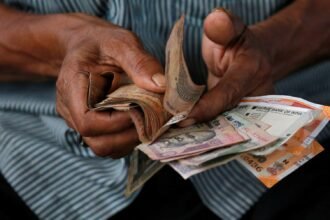- South Korean won leads losses in muted Asian FX trade
- Malaysia stocks hit highest since Dec 2020
- Thai baht down after deputy caretaker FM speech
The South Korean won fell the most in an otherwise subdued session for most Asian currencies on Wednesday, as traders looked for further clues on the magnitude of a widely anticipated rate cut by the Federal Reserve next month.
Markets have fully priced in a 25-basis point U.S. interest rate cut in the September meeting, after Fed Chair Jerome Powell signaled last week that the time had arrived to lower borrowing costs.
Traders are now looking to the personal consumption expenditures index on Friday and a key jobs report next week to assess whether the world’s most influential central bank would deliver a bigger 50 bps cut.
In Asia, the South Korean won
Results from major tech companies in the United States could sway sentiment in chip-heavy benchmarks such as South Korea and Taiwan, with chip giant Nvidia
Analysts say a soft landing for the U.S. economy and steady rate cuts in the coming months could underpin emerging Asian currencies.
“We expect most Asian currencies to make further gains over time, even if their biggest rallies may now be behind them,” Thomas Mathews, Head of Markets, Asia Pacific at Capital Economics said.
OCBC’s currency strategist Christopher Wong expects “the dollar to remain a “sell-on-rally” as the Fed cut amidst a goldilocks setting should provide a sweet spot for pro-cyclical currencies, including the South Korean won and Asian FX to recover.”
The Thai baht
Among Asian equities, Seoul stocks <.KS11> lost about 0.3%, while others in Singapore <.STI> and Bangkok <.SETI> fell 0.2% and 0.1% respectively.
Kuala Lumpur stocks <.KLSE>, however, turned out to be a significant outlier, gaining as much as 1.8% to hit their highest since mid December 2020, with the financial sector leading the gains. Malayan Banking
The Philippines peso
HIGHLIGHTS:
** Vietnam completes key power transmission line to northern industrial hub
** Party of Thailand’s new PM drops military-backed party from coalition government
** India’s NSE applies for no-objection with markets regulator for public offer
| Asian stocks and currencies at 0440 GMT | ||||||
| COUNTRY | FX RIC | FX DAILY % | FX YTD % | INDEX | STOCKS DAILY % | STOCKS YTD % |
| Japan | -0.39 | -2.39 | <.N225> | -0.03 | 14.38 | |
| China | -0.08 | -0.44 | <.SSEC> | -0.22 | -4.45 | |
| India | -0.02 | -0.88 | <.NSEI> | 0.01 | 15.13 | |
| Indonesia | +0.15 | -0.47 | <.JKSE> | 0.45 | 4.94 | |
| Malaysia | +0.07 | +5.71 | <.KLSE> | 1.37 | 15.15 | |
| Philippines | – | -1.44 | <.PSI> | 0.12 | 8.25 | |
| S.Korea | -0.43 | -3.64 | <.KS11> | -0.29 | 0.98 | |
| Singapore | -0.17 | +1.22 | <.STI> | -0.22 | 4.65 | |
| Taiwan | -0.08 | -3.82 | <.TWII> | 0.59 | 24.46 | |
| Thailand | -0.19 | +0.59 | <.SETI> | -0.03 | -3.67 | |
—Reporting by Archishma Iyer in Bengaluru; Editing by Shri Navaratnam





















